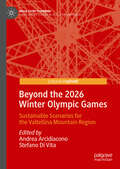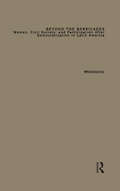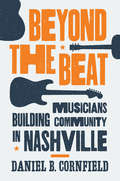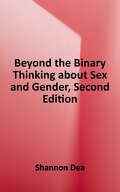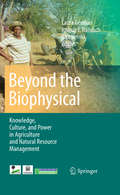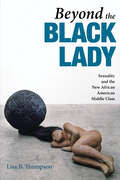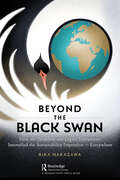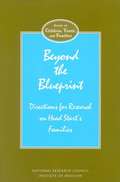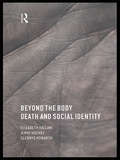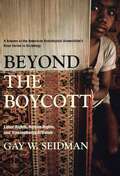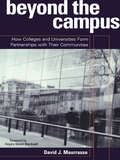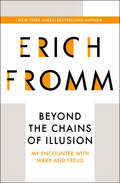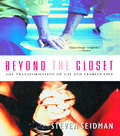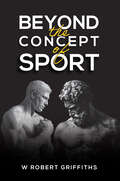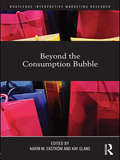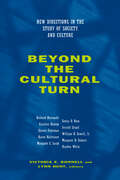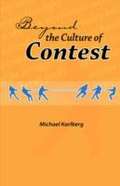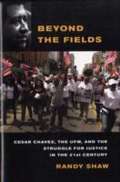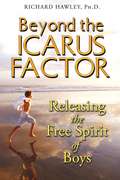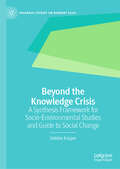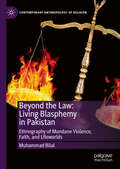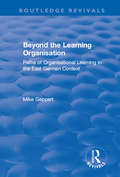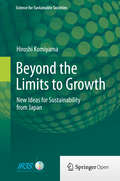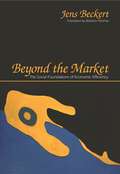- Table View
- List View
Beyond a Boundary
by C. L. R. JamesIn C.L.R. James' classic "Beyond a Boundary", the sport is cricket and the scene is the colonial West Indies. Always eloquent and provocative, James shows us how, in the rituals of performance and conflict on the field, we are watching not just prowess but politics and psychology at play. Part memoir of a boyhood in a black colony, part passionate celebration of an unusual and unexpected game, "Beyond a Boundary" raises, in a warm and witty voice, serious questions about race, class, politics and the facts of colonial oppression. Originally published in England in 1963 and in the United States twenty years later, this edition brings back in to print this emphatic statement on race and sport in society.
Beyond the 2026 Winter Olympic Games: Sustainable Scenarios for the Valtellina Mountain Region (Mega Event Planning)
by Stefano Di Vita Andrea ArcidiaconoThis volume offers a novel study of the Milan-Cortina's Winter Olympics 2026, with a focus on the mountainous region of Valtellina. It brings an up-to-date analysis of the complex interactions between mega-events and remote areas, both in terms of potentials for regeneration and risks for further segregation. Remote areas are traditionally characterized by socio-economic and spatial disparities. On the one hand, they benefit from attractive features, such as environmental and landscape resources, food and wine production, and energy production. On the other, they are by definition fragile environments, disrupted by the contradictions of international tourism, climate change, limited infrastructures and services, rural abandonment, and demographic decline.This book offers credible solutions for the sustainable development of mountainous regions as a legacy of Winter Olympics. It is an essential resource for scholars, professionals, and policy-makers in the fieldsof urban planning and design, architecture design, geography, sociology, and economics.
Beyond the Barricades: Women, Civil Society, and Participation After Democratization in Latin America (Comparative Studies in Democratization)
by Tracy FitzsimmonsFirst published in 2000. Beyond the Barricades explores how a transition to democracy affects civil society by tracing the levels and arenas of organized participation both before and after democratization. The group hardest hit by this transition to democracy is women who are often surprise to discover that democracies do not necessarily yield more gender equality or more opportunities for participation than dictatorships.
Beyond the Beat
by Daniel B. CornfieldAt a time when the bulwarks of the music industry are collapsing, what does it mean to be a successful musician and artist? How might contemporary musicians sustain their artistic communities? Based on interviews with over seventy-five popular-music professionals in Nashville, Beyond the Beat looks at artist activists--those visionaries who create inclusive artist communities in today's individualistic and entrepreneurial art world. Using Nashville as a model, Daniel Cornfield develops a theory of artist activism--the ways that artist peers strengthen and build diverse artist communities.Cornfield discusses how genre-diversifying artist activists have arisen throughout the late twentieth-century musician migration to Nashville, a city that boasts the highest concentration of music jobs in the United States. Music City is now home to diverse recording artists--including Jack White, El Movimiento, the Black Keys, and Paramore. Cornfield identifies three types of artist activists: the artist-producer who produces and distributes his or her own and others' work while mentoring early-career artists, the social entrepreneur who maintains social spaces for artist networking, and arts trade union reformers who are revamping collective bargaining and union functions. Throughout, Cornfield examines enterprising musicians both known and less recognized. He links individual and collective actions taken by artist activists to their orientations toward success, audience, and risk and to their original inspirations for embarking on music careers.Beyond the Beat offers a new model of artistic success based on innovating creative institutions to benefit the society at large.
Beyond the Binary: Thinking about Sex and Gender
by Shannon DeaHow are sex and gender related? Are they the same thing? What exactly is gender? How many genders are there? What is the science of all of this? Is gender a product of nature, nurture, or both? This book introduces readers to fundamental questions about sex and gender categories as they've been considered across the centuries and through a wide array of disciplines and perspectives. From the Bible to Darwin, from Enlightenment thinkers to contemporary trans philosophers, Beyond the Binary comprises an accessible survey of the wide range of views about sex and gender. This revised and expanded edition uses updated terminology and diagnostic criteria and offers new material with a greater focus on trans, Indigenous, racialized, and subaltern thinkers. It includes useful discussion questions and further reading recommendations at the end of each chapter, as well as an extensive glossary of terms.
Beyond the Biophysical: Knowledge, Culture, and Power in Agriculture and Natural Resource Management
by Ritu Verma Laura German Joshua J. RamischBeyond the Biophysical provides a broad overview of agriculture and natural resource management (NRM) scholarship and practice that lies beyond the biophysical, emphasizing instead epistemological, cultural, and political foundations of NRM. The volume is oriented toward professionals with expertise in agriculture and natural resource management scholarship and practice, but who lack exposure to the conceptual and methodological underpinnings of critical theory, the anthropology of development, ecological anthropology, and other relevant scholarship. It therefore follows common standards of academic rigour, but minimizes the use of jargon, integrates detailed case studies with conceptual syntheses, and attempts to move from critique to concrete recommendations for scholarship and practice. The volume seeks to foster a more nuanced and responsible engagement with local communities and the natural world among NRM scholars and practitioners.
Beyond the Black Lady: Sexuality and the New African American Middle Class (New Black Studies Series)
by Lisa B. ThompsonIn this book, Lisa B. Thompson explores the representation of black middle-class female sexuality by African American women authors in narrative literature, drama, film, and popular culture, showing how these depictions reclaim black female agency and illustrate the difficulties black women confront in asserting sexual agency in the public sphere. Thompson broadens the discourse around black female sexuality by offering an alternate reading of the overly determined racial and sexual script that casts the middle class "black lady" as the bastion of African American propriety. Drawing on the work of black feminist theorists, she examines symptomatic autobiographies, novels, plays, and key episodes in contemporary American popular culture, including works by Anita Hill, Judith Alexa Jackson, P. J. Gibson, Julie Dash, Kasi Lemmons, Jill Nelson, Lorene Cary, and Andrea Lee.
Beyond the Black Swan: How the Pandemic and Digital Innovations Intensified the Sustainability Imperative – Everywhere
by Rika NakazawaOf course, anyone would want to wake up from a really bad dream - especially one that seemed like it may never end, while successively stripping away joys and conveniences of our modern living. The COVID-19 pandemic bestowed on us a collective nightmare experience of varying intensity, akin to a "Black Swan" event, as author and mathematical philosopher Nassim Taleb might describe—given its universal rarity and devastating effects and seeming predictability in hindsight. However, we may remember this remarkable time in our history rather as a "White Swan" event—one that catalyzed a more common occurrence of evolving Environmental, Social, and Governance (ESG) principles, a mainstreaming of sustainability—fueled by the digital innovations that designed ways to survive and thrive into a new, and more holistic, world order. Now, as we emerge from the remnants of the pandemic’s aftermath, we find ourselves at the late dawn of a new geologic epoch—the "Anthropocene"—where the impact of humans on the planet’s geology and ecosystems looms so monumentally that the gravest threat to our existence stems from our own actions. Contained within these pages, you will discover insights from leaders across diverse domains—community, industry, public administration, and the investment community. Through their own experiences, we unfurl "White Swan sightings"— moments when sustainability flourished in response to reverberations of the COVID-19 virus. More poignantly, the journey ahead carries us beyond the realm of the Black Swan, while the acceleration of digital innovations equips us to herald a new era out of the Anthropocene and into a new one, with sustainability innovations as a critical placemat. The humanistic seismic shifts caused by the Pandemic will generate a future of holistic interoperability between digital and organic matters. We are on the brink of designing unprecedented harmony with each other and equilibrium of regenerative growth with the world around us. The urgency has never been greater, nor the possibilities so profound.
Beyond the Blueprint Directions for Research on Head Start's Families
by Roundtable on Head Start ResearchOn its 30th anniversary, public acceptance of Head Start is high, yet understanding of its goals is low, and evaluation research is limited in quality and scope. In this book, a roundtable of representatives from government, universities, medicine, and family support agencies identifies a set of research possibilities to generate a broader understanding of the effects of Head Start on families and children. Among the important issues discussed are the ethnic and linguistic diversity of Head Start families, the social conditions of the community context, and the implications of the changing economic landscape for both families and Head Start itself.
Beyond the Body: Death and Social Identity
by Elizabeth Hallam Jenny Hockey Glennys HowarthBeyond the Body presents a new and sophisticated approach to death, dying and bereavement, and the sociology of the body. The authors challenge existing theories that put the body at the centre of identity. They go 'beyond the body' to highlight the persistence of self-identity even when the body itself has been disposed of or is missing. Chapters draw together a wide range of empirical data, including cross-cultural case studies and fieldwork to examine both the management of the corpse and the construction of the 'soul' or 'spirit' by focusing on the work of: *undertakers *embalmers *coroners *clergy *clairvoyants *exorcists *bereavement counsellors.
Beyond the Boycott: Labor Rights, Human Rights, and Transnational Activism (American Sociological Association's Rose Series)
by Gay W. SeidmanAs the world economy becomes increasingly integrated, companies can shift production to wherever wages are lowest and unions weakest. How can workers defend their rights in an era of mobile capital? With national governments forced to compete for foreign investment by rolling back legal protections for workers, fair trade advocates are enlisting consumers to put market pressure on companies to treat their workers fairly. In Beyond the Boycott, sociologist Gay Seidman asks whether this non-governmental approach can reverse the "race to the bottom" in global labor standards. Beyond the Boycott examines three campaigns in which activists successfully used the threat of a consumer boycott to pressure companies to accept voluntary codes of conduct and independent monitoring of work sites. The voluntary Sullivan Code required American corporations operating in apartheid-era South Africa to improve treatment of their workers; in India, the Rugmark inspection team provides 'social labels' for handknotted carpets made without child labor; and in Guatemala, COVERCO monitors conditions in factories producing clothing under contract for major American brands. Seidman compares these cases to explore the ingredients of successful campaigns, as well as the inherent limitations facing voluntary monitoring schemes. Despite activists' emphasis on educating individual consumers to support ethical companies, Seidman finds that, in practice, they have been most successful when they mobilized institutions―such as universities, churches, and shareholder organizations. Moreover, although activists tend to dismiss states' capabilities, all three cases involved governmental threats of trade sanctions against companies and countries with poor labor records. Finally, Seidman points to an intractable difficulty of independent workplace monitoring: since consumers rarely distinguish between monitoring schemes and labels, companies can hand pick monitoring organizations, selecting those with the lowest standards for working conditions and the least aggressive inspections. Transnational consumer movements can increase the bargaining power of the global workforce, Seidman argues, but they cannot replace national governments or local campaigns to expand the meaning of citizenship. As trade and capital move across borders in growing volume and with greater speed, civil society and human rights movements are also becoming more global. Highly original and thought-provoking, Beyond the Boycott vividly depicts the contemporary movement to humanize globalization―its present and its possible future. A Volume in the American Sociological Association's Rose Series in Sociology
Beyond the Campus: How Colleges and Universities Form Partnerships with their Communities
by David J. MaurrasseThe role of the university and its relationship to the community has long been a highly debated topic among educators, administrators, and local business leaders. David J. Maurrasse offers a passionate appeal for community partnerships. Going further than a simple explanation of the problems at hand, Beyond the Campus offers a road map for both universities and local institutions to work together for the good of their communities.
Beyond the Chains of Illusion: My Encounter with Marx and Freud (Impacts Ser. #Vol. 21)
by Erich FrommProfound insights into Karl Marx and Sigmund Freud from the &“prolific and eclectic&” social theorist and bestselling author of Escape from Freedom (The Washington Post). According to renowned psychoanalyst Erich Fromm, three people shaped the essential character of the twentieth century: Albert Einstein, Karl Marx, and Sigmund Freud. While the first two figures had a great physical and political impact on the world, Fromm believes that Freud had an even deeper impact, because he changed how we think about ourselves. Beyond the Chains of Illusion is one of Fromm&’s most autobiographical works, as Fromm not only comments on the ideas of Freud and Marx, but also crystallizes his own theories on social character and unconscious values. The book brilliantly summarizes Fromm&’s ideas on how culture and society shape our behavior. This ebook features an illustrated biography of Erich Fromm including rare images and never-before-seen documents from the author&’s estate.
Beyond the Closet: The Transformation of Gay and Lesbian Life
by Steven SeidmanGay life has become increasingly open in the last decade. In Beyond the Closet , Steven Seidman, a well-known author and leading scholar in sexuality, is the first to chronicle this lifestyle change and to look at the lives of contemporary gays and lesbians to see how their "out" status has changed. This compelling, well-written, and smart account is an important step forward for the gay and lesbian community.
Beyond the Concept of Sport
by W Robert GriffithsBeyond the Concept of Sport challenges tired assumptions about athletics to unveil sports’ underestimated yet far-reaching social impact and philosophical significance. While governments downplay its influence, author Robert Griffiths recognizes that sports – especially cricket – deeply channels the human spirit for participants and fans alike. He eschews cliches to deliver fresh insight into sports’ resonance. This is no dry academic tome, but rather a lively examination blending scholarship with accessibility. Griffiths brings iconoclastic yet sage opinions to unpacking how athletic pursuits shape culture and consciousness. He illuminates the under-appreciated role sports play in forging identity, purpose, inspiration, escapism and more for millions globally. Grappling with issues often overlooked when discussing athletics, Griffiths’ unconventional analysis explores fandom, nationalism, arts, business, and the very meaning woven through sports’ rituals. Written with passionate intellect, wry wit, and a distaste for the dull, Beyond the Concept of Sport cries out to be read by both die-hard fans and curious sceptics. After all, few human realms spark such fervour and unity across the world’s divides like that of sports. This book captures that emotional impact while elevating sports as a subject worthy of serious yet spirited consideration.
Beyond the Consumption Bubble (Routledge Interpretive Marketing Research)
by Karin M. EkströmResearch on consumption can shed light on many fundamental questions, such as the character of society, including social and cultural dimensions; the relations between the generations; dependency on technology and the risks involved; the rise of Asia and its potential consumption preferences; the question of whether we must continuously increase our consumption to avoid a recession and whether this is ecologically sustainable. In the field of consumption research there is need for analytical rigor based on theory and empirical evidence as well as discussions that will inspire readers to ask important questions regarding future development. The contributors to this innovative volume are scholars and experts in the field of consumption representing a variety of disciplines such as anthropology, economics, history, marketing, political science, and sociology. This book not only provides readers with a nuanced picture of consumption, but intends to enrich and sharpen the general debate about society today.
Beyond the Cultural Turn: New Directions in the Study of Society and Culture (Studies on the History of Society and Culture #34)
by Margaret C. Jacob Richard Biernacki Jerrold Seigel Karen Halttunen Sonya O. Rose Hayden White William H. Sewell Margaret R. Somers Caroline Bynum Steven FeiermanNothing has generated more controversy in the social sciences than the turn toward culture, variously known as the linguistic turn, culturalism, or postmodernism. This book examines the impact of the cultural turn on two prominent social science disciplines, history and sociology, and proposes new directions in the theory and practice of historical research.The editors provide an introduction analyzing the origins and implications of the cultural turn and its postmodernist critiques of knowledge. Essays by leading historians and historical sociologists reflect on the uses of cultural theories and show both their promise and their limitations. The afterword by Hayden White provides an assessment of the trend toward culturalism by one its most influential proponents.Beyond the Cultural Turn offers fresh theoretical readings of the most persistent issues created by the cultural turn and provocative empirical studies focusing on diverse social practices, the uses of narrative, and the body and self as critical junctures where culture and society intersect.
Beyond the Culture of Contest: From Adversarialism to Mutualism in an Age of Interdependence (George Ronald Baha'i Studies)
by Michael Robert KarlbergHow can social change come about? Is it possible to have democratic government without political parties? Can we have a productive economy without unfettered and aggressive competition? How can social and ecological ills be addressed without resorting to a 'culture of protest'? Adversarialism has become the predominant strand in contemporary western-liberal societies. Throughout the public sphere, competitive and conflictual practices have become institutionalised norms. In his analysis of present-day society, Michael Karlberg puts forward the thesis that our present 'culture of contest' is both socially unjust and ecologically unsustainable and that the surrounding 'culture of protest' is an inadequate response to the social and ecological problems it generates. The development of non-adversarial structures and practices is imperative. Dr Karlberg considers various historical and contemporary expressions of mutualism, including expressions within feminism, systems theory, ecology and environmentalism, communication theory and alternative dispute resolution, and presents a case study of the Baha'i community and its experience as a working, non-adversarial model of social practice. The prescriptions and practices of the Baha'i community provide a viable and workable alternative to the culture of contest.
Beyond the Fields: Cesar Chavez, The UFW, and the Struggle for Justice in the 21st Century
by Randy ShawShaw reveals the untold story behind "si se puede," which is still setting the course for today's progressive movements, by tracing the legacy of Chavez and the United Farm Workers of America (UFW).
Beyond the Icarus Factor: Releasing the Free Spirit of Boys
by Richard HawleyA call to reconsider the place of boys in the family, schools, and community institutions that rob them of their inborn vitality and creativity • Argues that boys have a unique free-spirit nature and that efforts to alter or suppress it lead to profound unhappiness, pathology, or startling compulsions • Demands another approach to societal expectations, one that values and promotes the daring creativity of boys Richard Hawley’s many years as headmaster of a boys’ school have convinced him that boys do indeed have a unique, intrinsic, and inalienable free-spirit nature. He sees deep flaws in the way we--as parents, educators, and community members--alter or suppress that true nature in order to turn boys into men that fit our societal template. Hawley argues that the “model man” in our society, while seemingly successful in his role, may yet be unhappy in his life. The very elements that we strip away from a boy’s natural tendencies are the sources of spirituality and vitality that can give his life both meaning and satisfaction. Without these, he is lost to his essential nature.A new approach is needed, says Hawley, and he goes to the roots of Western theology and philosophy to locate what has gone wrong and how those consequences might be addressed. He sounds the clarion call to unleash, promote, and celebrate the seemingly dangerous pursuits that reflect the creativity and daring nature of boys. Fantasy and imagination must trump cognition and problem solving. We must not hold our boys back with our fears of failure but give them the tools and support they need to create wings good enough to fly wherever they wish to go.
Beyond the Knowledge Crisis: A Synthesis Framework for Socio-Environmental Studies and Guide to Social Change (Palgrave Studies on Norbert Elias)
by Debbie KasperIn the face of complex, interwoven, planet-scale problems, many cite the need for more integrated knowledge—especially across the natural and social sciences. Excessive specialization, they argue, gets in the way of knowing what we know, much less being able to use it to address urgent socio-environmental crises. These concerns, it turns out, go back centuries. This book picks up where most leave off, exploring the history of how we got here and proposing a way forward. Along the way, readers find that the synthesis long called for depends on theoretical advancements in social science. Fortunately, the author argues, we have everything we need to achieve those advancements, thanks largely to the contributions of Norbert Elias. Integrating his insights with history, science, sociological theory, and more, this book neatly packages the upgraded paradigm we need to be able to meaningfully address complex socio-environmental problems and more intentionally shape humanity’s collective future.
Beyond the Law: Ethnography of Mundane Violence, Faith, and Lifeworlds (Contemporary Anthropology of Religion)
by Muhammad BilalThe book embarks on a journey into the intricate landscape of blasphemy in Pakistan amid a rising tide of blasphemy accusations, public lynchings, and contentious blasphemy laws. Challenging conventional perspectives, this book delves beyond legal and religious confines, offering an ethnography of the mundane as a secular reading and a grand existential scheme to highlight how blasphemy laws and religious prisms often fail to capture the essence of the blasphemy dilemma in Pakistan. The author offers an insightful re-evaluation of the blasphemy issue, addressing its multifaceted definition, the motivations driving intentional blasphemous acts and frivolous accusations, the authority to punish alleged offenders, the paradox of religious violence, and the emergence of mediated expressions and virtual negotiation of blasphemy. Through meticulous grassroots analysis of ordinary Pakistanis’ perspectives, the book offers pragmatic policy solutions for blasphemy issues, presenting unorthodox insights into Pakistan, its diverse populace, and the ever-evolving sensibilities of Islam and societal dynamics in both local and global contexts.
Beyond the Learning Organisation: Paths of Organisational Learning in the East German Context (Routledge Revivals)
by Mike GeppertThis title was first published in 2000. In contemporary management literature, the idea that managers and organizations should learn and provide widespread capabilities for learning to learn is gaining popularity. Some see reflexive thinking and learning as being the proper response to the transformation of industrial society. However, this study is not concerned too much with the reasons for learning, but is more about how actors and groups of actors actually learn and the resources at their disposal for learning. The study aims to show that differences in social context do matter, and analyzes the organizational learning process in the political and social transformation of East Germany.
Beyond the Limits to Growth: New Ideas for Sustainability from Japan (Science for Sustainable Societies)
by Hiroshi KomiyamaAt a time when contemporary challenges seem to many to be insurmountable, this book offers an optimistic view of the future and provides a road map for societies to get there. Drawing upon extensive research and many years as a thought leader in environmental and sustainability issues in Japan and internationally, Hiroshi Komiyama analyzes the most pressing challenges to the attainment of sustainability of economically advanced nations and argues forcefully for Japan to lead them out of the present dilemma through active promotion of creative consumer and societal demand. He shows how an active industry-government-academic partnership can provide the environment needed to promote such new creative demand and illustrates its potential through presentation of a Platinum Society Network that was launched on a regional basis in Japan in 2010 to facilitate the solution of common issues through the exchange of information and ideas. What is perhaps most surprising about the text is its unwavering optimism supported by hard evidence, history, and insightful observation. Problems arising from new paradigms of the 21st century (what the author refers to as "exploding knowledge, limited Earth resources, and aging societies") thwart sustainable development in advanced and developing countries alike. All countries will struggle with issues that evolve from these paradigms including diminishing resources, expanding budget deficits, and growing global environmental problems. This window on potential practical pathways and solutions should be of interest to all those engaged in seeking ways to meet these contemporary challenges.
Beyond the Market: The Social Foundations of Economic Efficiency
by Jens BeckertBeyond the Market launches a sociological investigation into economic efficiency. Prevailing economic theory, which explains efficiency using formalized rational choice models, often simplifies human behavior to the point of distortion. Jens Beckert finds such theory to be particularly weak in explaining such crucial forms of economic behavior as cooperation, innovation, and action under conditions of uncertainty--phenomena he identifies as the proper starting point for a sociology of economic action. Beckert levels an enlightened critique at neoclassical economics, arguing that understanding efficiency requires looking well beyond the market to the social, cultural, political, and cognitive factors that influence the coordination of economic action. Beckert searches social theory for the components of an alternative theory of action, one that accounts for the social embedding of economic behavior. In Durkheim and Parsons he finds especially useful approaches to cooperation; in Luhmann, a way to understand how people act under highly contingent conditions; and in Giddens, an understanding of creative action and innovation. Together, these provide building blocks for a research program that will yield a theoretically sophisticated understanding of how economic processes are coordinated and the ways that markets are embedded in social, cultural, and cognitive structures. Containing one of the most fully informed critiques of the neoclassical analysis of economic efficiency--as well as one of the most thoughtful blueprints for economic sociology--this book reclaims for sociology the study of one of the most important arenas of human action.

